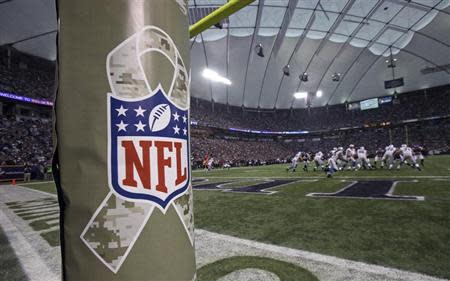Lawsuit delays bond sale for new NFL stadium in Minneapolis: report

(Reuters) - Officials in Minnesota said on Sunday a lawsuit filed in state supreme court challenging the funding of a new stadium for the National Football League's Vikings will postpone a bond sale, according to local media. The state planned to begin selling $468 million of bonds on Monday to help fund a 65,000-seat stadium in Minneapolis, expected to cost $975 million. But former mayoral candidate Douglas Mann, his wife Linda, and former city school board member David Tilsen filed a lawsuit on Friday in Minnesota Supreme Court challenging the constitutionality of the funding plan, according to the Star Tribune. The Minnesota Sports Facilities Authority will own and operate the stadium, which is expected to be open by the beginning of the 2016 NFL season. A delay in the bond sale could jeopardize the project schedule, according to Michele Kelm-Helgen, chairwoman of the authority, who spoke on Sunday during a conference call, the Star Tribune said. If funds are not available through the bond sale by January 23, the Minnesota Sports Facilities Authority will not be able to pay its bills on time and could cause the opening of the stadium to be delayed for a year, she said. Since 1982, the Vikings had played in the Hubert H. Humphrey Metrodome, an 64,000-seat indoor stadium with an inflatable roof. Between 1982 and 2009, the stadium was also home to Major League Baseball's Twins. The Vikings began lobbying for a new stadium more than a decade ago, before owner Zygi Wilf bought the team in 2005. Talks intensified as the 30-year Metrodome lease neared an end and the stadium's roof collapsed in a 2010 blizzard, forcing the Vikings to play two home games elsewhere In 2012, Minnesota Governor Mark Dayton signed a bill authorizing a partly bond-financed plan for the new stadium. The Vikings are to be the main tenant, but the publicly owned stadium would also host other events including state high school football and soccer championships, amateur sports and concerts. (Reporting by Brendan O'Brien; Editing by Eric Walsh)
